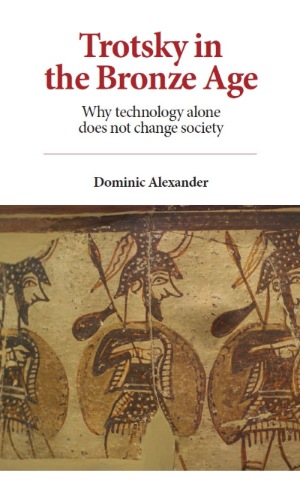
History is not linear, it’s created through social struggles, argues Dominic Alexander in this extract from his new book Trotsky in the Bronze Age

Uneven and combined development as a dialectical process can therefore be a powerful tool to unlock the processes involved throughout social development, and not merely during a particular phase of capitalism. As far back as the Neolithic period, it is not just a matter of there being ‘uneven’ development across different societies, but the impact of distinct stages of development upon each other means that the unfolding of history never repeats itself in a linear fashion, but produces contradictory and novel forms.
Even the pioneering Neolithic societies of Europe produced different cultural expressions, when coming into contact with previous Mesolithic groups, than were found where agricultural communities developed directly out of hunter-gatherer groups over a longer period of time. This example comes closest to a simple case of ‘uneven’ development, but even here that concept is not sufficient to capture the distinctiveness of the contrasting historical developments. Even more so, the complex patterns of the successive rise and collapse of Bronze Age societies, class and non-class alike, point to the contradictory processes that can be illuminated by Trotsky’s theory.
These discussions have necessarily focused on just one corner of the world, but the method suggests the irreducible nature of particular histories, such that it could be applied elsewhere with fruitful results. Such an approach does not pre-suppose any kind of developmental template on the histories of civilisational clusters in the wider Indian or Chinese worlds, for example, while suggesting parallel problems and patterns. The relationship of Chinese societies, in particular, to northern nomadic groups would be an obvious area for exploration. Equally the emergence of the Ch’in dynasty (221-207 BCE) on the western fringe of the Chinese states could be a case either of simple uneven development, or where combined development enabled a new state form to arise.[94] Elsewhere, Anievas and Nişancıoğlu, and other scholars, have made persuasive cases for other examples of uneven and combined development having great explanatory power, such as in early-modern Safavid Empire of Iran, the Ottoman or Mughal Empires where ‘the interaction of tributary and nomadic societies resulted in dynamic political forms that were irreducible to either polity’.[95]
The whole debate highlights an important aspect of both Trotsky’s theory, and of the problem of modes of production in general. The slave mode of production cannot be understood simply as coterminous with one polity, that is to say, the Roman Empire, as it sometimes is, any more than capitalism can be understood as the product of a single economy, of England, for example. A mode of production cannot be adequately understood through a strictly internal analysis, but has to be seen in the totality of its context; the real boundaries of a mode of production are necessarily wider than the political boundaries of a particular polity.[96]
At the general conceptual level, the dynamics of social development cannot be grasped through a formalistic analysis, which defines categories abstractly from their historical particularities. Rather, modes of production must be understood precisely as products of particular historical circumstances, and are not prior abstractions. European feudalism was not a set of relations that could develop anywhere, at any time, but was precisely the result of the collision of the advanced, and predatory, social relations of Rome with the still tribal relations of the Roman hinterland.
European feudalism only makes sense in terms of its status as a successor class society to the Roman. The application of the dialectical tools of uneven and combined development clarifies and reveals these dynamics in exactly the way a fruitful Marxist methodology should. As Trotsky wrote, ‘Marxism is above all a method of analysis.’[97] The method of analysis, moreover, is deeply tied to an ultimately optimistic understanding of the role of conscious activity in human history. The consequence of uneven and combined development for contemporary capitalism was permanent revolution; that the unfolding of capitalist relations globally produced not an ordered succession of stages of development, but a continuing social crisis that opened up the possibility of world-wide socialist revolution.
The extension of uneven and combined development deep into human history reveals the antecedents of permanent revolution. Firstly, this was the long resistance to the expansion of class rule in the neolithic period and the long Bronze Age, which could doubtlessly be paralleled across the world in efforts to resist the spread of exploitation into the modern era. More generally the lesson is that societies confronted with new conditions react not in a series of predictable, mechanical stages, but through the unpredictable workings of social struggle. Human beings do indeed make their own history.
[94] Tőkei, Asiatic Mode of Production, p.67.
[95] Alexander Anievas and Kerem Nişancıoğlu, ‘Lineages of Capital.’ in Historical Materialism 26.3, pp167-196; p.176.
[96] This is to agree broadly with the approach taken by Anievas and Nişancıoğlu in their controversy with the ‘political Marxists’ over the origins of capitalism; Anievas and Nişancıoğlu, How the West Came to Rule, p.48, for example.
[97] Trotsky, History of the Russian Revolution, volume 3, p.389.
Join Revolution! May Day weekender in London
The world is changing fast. From tariffs and trade wars to the continuing genocide in Gaza to Starmer’s austerity 2.0.
Revolution! on Saturday 3 – Sunday 4 May brings together leading activists and authors to discuss the key questions of the moment and chart a strategy for the left.

